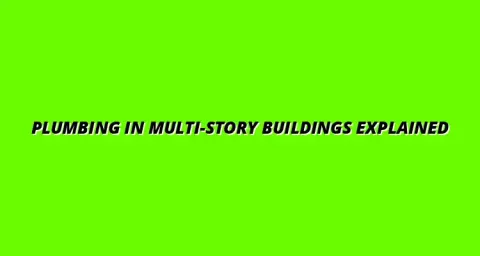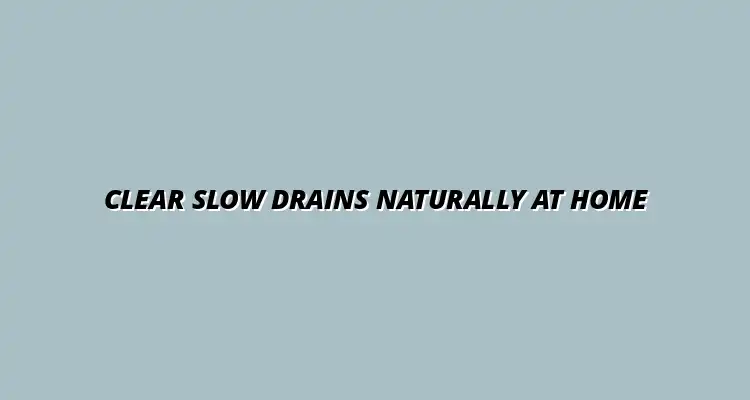
- Plumbing Basics
- Jan 19
2025-02-08
When your drains aren't working as they should, it can be frustrating. Slow-moving drains often indicate a problem deep within the plumbing system. Understanding what causes these issues is the first step in finding effective solutions!
Slow-moving drains can be caused by a variety of factors, from simple clogs to more complex systems issues. Knowing the anatomy of your drainage systems can help pinpoint where the problem lies. Once you understand the structure, you'll be better equipped to tackle any slow drain problems that arise.
Every drain is part of a larger plumbing system, which includes pipes, traps, and vents. The pipes transport wastewater away from your home, while traps prevent unpleasant odors from entering. When any of these components fail or become blocked, it can lead to slow drainage.
To visualize this, think of your plumbing system as a network of highways. If there’s a traffic jam (a clog), everything slows down! It's essential to maintain all parts of this system to ensure smooth operations.
It’s crucial to catch drain issues early. Here are some common signs that you might have a slow-moving drain:
If you notice any of these symptoms, it might be time to investigate further. Ignoring these signs can lead to bigger problems down the road!
Understanding how your drainage system works can help you keep it clear. When water exits your home, it flows through a series of pipes that lead to the main sewer line. Gravity plays a vital role, ensuring that water flows smoothly away from your home.
Although modern systems are designed to handle a lot of usage, they can still become clogged. Regular maintenance is essential to keep everything flowing smoothly. Make sure to keep an eye on your drains to prevent slowdowns!
Slow drains can often be traced back to a few common culprits. Identifying these issues early can help you address them before they become major problems. Here are some frequent causes of slow-moving drains:
Each of these causes contributes to the frustration of a slow drain. Knowing what to look for can save you time and effort in resolving these issues!
One of the most common causes of slow drains, especially in bathrooms, is the accumulation of hair. Hair can create a tangled mess that traps soap, dirt, and other debris. This buildup can lead to clogs that make your drains slow.
To prevent this, consider using drain guards or screens to catch hair before it goes down the drain. Regular cleaning can also help keep things flowing smoothly!
In kitchens, grease and soap scum can create serious problems. When you pour grease down the drain, it can solidify and stick to the pipe walls. Over time, this can cause significant slowdowns in water flow.
To combat grease, always dispose of cooking oils in the trash. You can also use hot water to dissolve small amounts of grease before it hardens!
Sometimes, slow-moving drains can be attributed to tree roots invading underground pipes. As they search for water, roots can break through pipe joints and create blockages. This is especially common in older neighborhoods with mature trees.
To avoid this issue, consider the location of your trees when planting new ones. Regular inspections of your pipes can also help catch any root problems early.
Taking steps to prevent slow-moving drains can save you a lot of hassle and money in the long run! Simple practices can go a long way in maintaining your drainage system and ensuring it functions smoothly. Let’s explore how you can keep your drains in top shape.
One effective way to ensure your drains remain clear is through routine maintenance. This means regularly checking and cleaning your drains to avoid the buildup of debris. By implementing a few straightforward practices, you can effectively prevent clogs. For example, learning natural ways to clean drains can be very beneficial.
Implementing a consistent drain cleaning routine is essential. This could include simple tasks like flushing your drains with hot water or using natural cleaning solutions. Here are some effective practices to consider:
By keeping up with these practices, you can significantly reduce the risk of slow-moving drains and other related issues. Remember, prevention is always better than cure!
Adopting the right habits can make a significant difference in the health of your drains. Here are some best practices to incorporate into your routine:
These habits, when practiced consistently, can help maintain a clear drainage system. Remember, a little effort goes a long way in preventing drain problems!
While there are effective ways to maintain your drains, there are also common mistakes that can lead to bigger issues. Being aware of these pitfalls can help you avoid worsening the situation. Here are some mistakes to watch out for:
By avoiding these mistakes, you can keep your drains functioning optimally. Remember, it’s all about smart practices!
Many people turn to chemical drain cleaners when faced with clogs. However, for a more natural approach to unclogging your drains, consider these natural methods for unclogging drains. These products often do more harm than good. They can corrode pipes and lead to more severe drain issues!
Instead, I recommend using natural alternatives that are safe for your plumbing. Not only are they less harmful, but they can also be just as effective. It’s a win-win!
Knowing what can and cannot go down your drain is crucial. Certain items can cause major blockages and should always be avoided:
Being mindful of these prohibited items will help in keeping your drains healthy. Remember, a little awareness can go a long way in preventing future problems!
With so many myths surrounding drain maintenance, it’s essential to clarify some common questions. Let’s dive into some frequently asked questions to help you better understand how to maintain your drains!
Many people have misconceptions about cleaning drains, especially when it comes to using natural methods. Here are a couple of common myths:
By busting these myths, you can make informed decisions about how to maintain your drains effectively.
Natural methods often provide a safe and effective means of cleaning drains. They can break down buildup without causing harm to your pipes. I’ve found that using these methods regularly can lead to long-term benefits for your plumbing system! For more tips on unclogging your drain naturally, visit this helpful guide: how to unclog your drain naturally.
So, if you’re dealing with slow-moving drains, consider turning to natural solutions before reaching for harsh chemicals. Your drains will thank you!
This is a great question that many homeowners ponder! While some may think combining methods can enhance effectiveness, it’s often not the best choice.
Mixing chemical cleaners with natural solutions can lead to dangerous chemical reactions. It's best to use one method at a time to avoid complications. Stick to safe, natural solutions whenever possible, and you’ll likely see positive results!
Sometimes, despite our best efforts, we may still encounter stubborn drain problems. Knowing when to call a plumber is vital to avoid further damage. Here are some signs that indicate professional intervention is needed:
Recognizing these signs early can save you time and money. If you need a plumber in Birmingham, consider checking out this local Birmingham plumber. It’s always better to be safe than sorry!
The cost of hiring a plumber can vary based on location and the severity of the problem. On average, you might expect to pay between $100 to $300 for drain cleaning services.
While this might seem like a lot, consider it an investment in your home. Addressing issues early can prevent more expensive repairs down the road. For a clogged kitchen sink, you might find this guide on fixing a clogged kitchen sink helpful. Remember, you deserve a working plumbing system!
For those tackling bathtub drain clogs, a natural approach might be the best option. Check out these DIY tips for unclogging your bathtub drain naturally.
In summary, keeping your drains healthy requires a combination of regular maintenance and the right practices. Utilizing natural solutions can greatly benefit your drainage system while avoiding harsh chemicals. I encourage you to adopt these practices!
Don’t underestimate the importance of taking care of your drains! Implementing simple habits can lead to long-lasting benefits for your home. Let’s keep our drains flowing smoothly!
